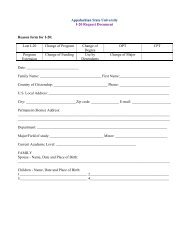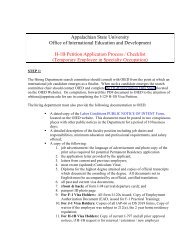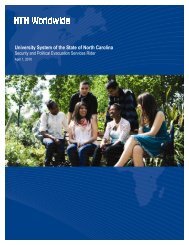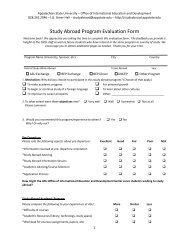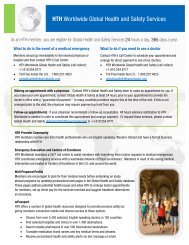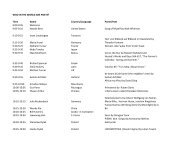Program Leader Handbook - International Education and ...
Program Leader Handbook - International Education and ...
Program Leader Handbook - International Education and ...
Create successful ePaper yourself
Turn your PDF publications into a flip-book with our unique Google optimized e-Paper software.
Appalachian Overseas <strong>Education</strong> <strong>Program</strong>s <strong>Program</strong> <strong>Leader</strong> <strong>H<strong>and</strong>book</strong><br />
5. Student Safety<br />
39<br />
<br />
<br />
<br />
Discuss safety on the street:<br />
- Discuss high crime areas <strong>and</strong> crime patterns to avoid (get information from the Department of State country pages).<br />
- Encourage a “buddy system” <strong>and</strong> advise students that they should not travel alone, especially at night.<br />
- Advise against using shortcuts, narrow alleys, or poorly lit streets.<br />
- Advise students to exercise caution in or avoid areas <strong>and</strong> situations such as: crowds, tourist sites, protests <strong>and</strong> demonstrations,<br />
known dangerous places, etc.<br />
- Advise students to beware of scam artists <strong>and</strong> of strangers who approach offering bargains or being a guide. Students<br />
should not discuss travel plans or other personal matters with strangers.<br />
- Advise students to beware of pickpockets. They often have an accomplice who will jostle, ask for directions or the time,<br />
point to something spilled on clothing, or create a disturbance to distract the traveler. A child or even a woman carrying a<br />
baby can be a pickpocket. Students should also beware of vagrant children who create a distraction while picking pockets.<br />
- Advise students to carry only the minimum number of important documents, <strong>and</strong> that they should plan a place or places<br />
to conceal them. Passport, cash, <strong>and</strong> credit cards are most secure when locked in a hotel safe. If students need to carry<br />
those documents, they should conceal them in several places rather than putting them all in one wallet or pouch.<br />
- Advise against using h<strong>and</strong>bags, fanny packs, <strong>and</strong> outside pockets, which are easy targets for thieves. Advise putting<br />
money in a money belt or neck pouch hidden under clothing rather than in a backpack that can be easily opened from<br />
behind. When carrying a bag, students should wear the shoulder strap of the bag across the chest <strong>and</strong> walk with the bag<br />
away from the curb to avoid drive-by snatchers.<br />
- Remind students to seem purposeful when moving about. Even if lost (students should carry maps), they should act as if<br />
they know where they are going. When possible, they should ask directions only from individuals in authority.<br />
- Students should remain inconspicuous by keeping a low profile (conservative clothing, avoiding loud conversations…)<br />
<strong>and</strong> not drawing attention to nationality or wealth.<br />
- Explain how to use a pay phone <strong>and</strong> remind students to have the proper change or tokens on h<strong>and</strong>.<br />
- Teach a few phrases in the local language to signal a need for help, the police, or a doctor.<br />
Discuss safety in hotels:<br />
- Keep hotel doors locked at all times. Meet visitors in the lobby.<br />
- Do not leave money <strong>and</strong> other valuables in the hotel room while out. Use the hotel safe.<br />
- Let someone know when to expect your return. Do not leave alone.<br />
- If out late at night alone, do not get on an elevator if there is a suspicious-looking person inside.<br />
- Read the fire safety instructions in the hotel room. Know how to report a fire. Know where the nearest fire exit <strong>and</strong> alternate<br />
exits are located. Count the doors between the room <strong>and</strong> the nearest exit as this could be a lifesaver if required to<br />
crawl through a smoke-filled corridor.<br />
Discuss safety on public transportation:<br />
- Only take taxis clearly identified with official markings. Beware of unmarked cabs. Ask for, <strong>and</strong> where appropriate, negotiate<br />
the fare before entering the cab.<br />
- If the way is being blocked by a stranger <strong>and</strong> another person is very close behind, move away. This can happen in the<br />
corridor of a train or on the platform of a train station.<br />
- Do not accept food or drink from strangers. Criminals have been known to drug food or drink offered to passengers.<br />
Criminals may also spray sleeping gas in train compartments, so lock the train cabin.<br />
- Do not be afraid to alert authorities if feeling threatened in any way. Extra police are often assigned to ride trains on<br />
routes where crime is a serious problem.<br />
Revision Date 5/8/13<br />
507_AOEP_<strong>Leader</strong><strong>H<strong>and</strong>book</strong>



